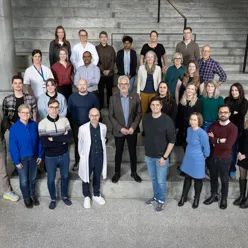The MS Node has longstanding and internationally recognised research expertise ranging from basic immunopathological characterisation and preclinical animal studies to epidemiology, clinical course, imaging, clinical trials, health economics, and patient-reported outcome measures.
Node leader: Kjell-Morten Myhr
Kjell-Morten Myhr is a senior consultant and professor of neurology. Since 2001, he has chaired the Bergen Multiple Sclerosis (MS) Research Group at Haukeland University Hospital and the University of Bergen. He has previously chaired the Norwegian MS Competence Centre, the Norwegian MS Registry, and the first KG Jebsen Centre for Medical Research (in MS). He is currently the director of Neuro-SysMed.
Research Focus
The MS Node is addressing major challenges in MS therapy, aiming to optimise the treatment of relapsing-remitting MS with early high-efficacy therapies and stem cell therapy for patients experiencing breakthrough disease activity. Additionally, we are focusing on treating the neurodegenerative component in progressive MS, as well as the symptomatic management of pain and spasticity. Most recently, we are exploring novel antiviral treatment targets for the treatment and prevention and of the disease.
Node activities
The MS Node has extensive experience in various aspects of diagnosing and treating MS. Ongoing research projects aim to define the importance of potential risk factors and biomarkers for prognosis and treatment response with the goal of optimising treatment strategies at different disease stages. Overall, the goal is to develop tailored treatment strategies for MS patients. Major challenges include enhancing the use of existing disease-modifying therapies and defining new disease pathways that can be targeted by novel treatments, which is especially crucial for addressing the neurodegenerative component in progressive MS. Additionally, we are developing new treatment strategies for potential disease prevention. Currently, the MS Node is conducting twelve investigator-initiated and six industry-sponsored clinical trials.
See an overview of the MS Node clinical trials on the page MS and clinical studies.
Biomarker Studies
The MS Node is currently involved in immune phenotyping cells from patients included in ongoing clinical trials to identify biomarkers for treatment response. Our goal is to define disease remission to tailor dosing, treatment duration, and patient selection for different therapies.
Additionally, we are studying the potential of extracellular vesicles as biomarkers for disease activity and response to B-cell depletion therapy in relapsing-remitting MS.
We also conduct preclinical cell culture and animal studies to evaluate possible disease pathways of progressive MS and the regenerative potential of stem cell therapy, as well as the role of microglia in these disease processes.
Treatment responses are further assessed using neurofilament biomarkers in both cerebrospinal fluid and serum. In collaboration with the Mohn Medical Imaging and Visualization Centre at Haukeland University Hospital, we evaluate treatment responses using magnetic resonance imaging (MRI).
MS-registry studies
The MS-registry part of the MS Node is conducting long-term safety studies of MS-therapies and analysing real-world data on treatment compliance and factors influencing discontinuation rates for ongoing therapies. They are also evaluating benefit from early high-efficacy treatment compared to an escalation treatment strategy.
